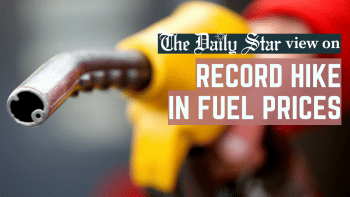When will fuel prices be adjusted?

For traders, there may be a vested interest in keeping prices high. After all, high prices, justified or not, may mean increased profits, which traders are unlikely to turn away from. But how to justify a government position that seems to support the same profiteering mentality? When the government increased prices of different types of fuel by up to 51.7 percent in August 2022—later reducing them marginally amid widespread criticism—it was promised that fuel prices would be aligned with international benchmarks, meaning that if international prices went down, so would domestic prices. But that has not happened, and ordinary consumers have had to pay for it as the prices of almost every other thing also rose concomitantly. For the government, however, this meant exorbitant profits.
Citing data from the state-run Bangladesh Petroleum Corporation (BPC), Prothom Alo reports that the corporation recorded a profit of Tk 4,586 crore in the 2022-2023 fiscal year, with additional revenue generated through taxes and levies. The first six months of this fiscal year have also seen a profit of over Tk 400 crore. At a time when many government institutions have recorded losses year after year, the BPC has been a shining exception, turning profits in eight of the last nine years. As a result, while citizens' coffers shrunk owing to inflated fuel prices, the government's swelled.
Besides BPC, we have also seen Petrobangla make profits by increasing gas prices, and Wasa by hiking water tariffs. If the new cabinet wants to bring down commodity prices—as it has vowed to do—this is where it should turn as a starting point. But as things stand, the government, despite its declared intent, seems to be endorsing an inverse relationship between the international and domestic prices of fuel.
Experts say it has had the scope to reduce prices, but it didn't. They noted how the IMF, as part of a loan deal, had recommended regular price adjustments based on global market conditions, but the government has yet to follow it through. Initially, the plan was to adjust fuel prices after every three months, but now a monthly review is reportedly being planned from April onwards. Given past trends, there is no guarantee that this will indeed be the case. But whatever the format or frequency of price determination, it must prioritise people over profits. We urge the government to urgently reduce the financial burden for citizens by lowering fuel prices.


 For all latest news, follow The Daily Star's Google News channel.
For all latest news, follow The Daily Star's Google News channel. 








Comments